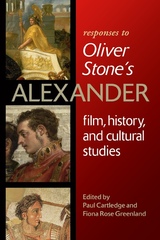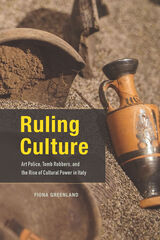2 books by Greenland, Fiona

Responses to Oliver Stone’s Alexander
Film, History, and Cultural Studies
Edited by Paul Cartledge and Fiona Rose Greenland; Afterword by Oliver Stone
University of Wisconsin Press, 2009
The charismatic Alexander the Great of Macedon (356–323 B.C.E.) was one of the most successful military commanders in history, conquering Asia Minor, Egypt, Persia, central Asia, and the lands beyond as far as Pakistan and India. Alexander has been, over the course of two millennia since his death at the age of thirty-two, the central figure in histories, legends, songs, novels, biographies, and, most recently, films. In 2004 director Oliver Stone’s epic film Alexander generated a renewed interest in Alexander the Great and his companions, surroundings, and accomplishments, but the critical response to the film offers a fascinating lesson in the contentious dialogue between historiography and modern entertainment.
This volume brings together an intriguing mix of leading scholars in Macedonian and Greek history, Persian culture, film studies, classical literature, and archaeology—including some who were advisors for the film—and includes an afterword by Oliver Stone discussing the challenges he faced in putting Alexander’s life on the big screen. The contributors scrutinize Stone’s project from its inception and design to its production and reception, considering such questions as: Can a film about Alexander (and similar figures from history) be both entertaining and historically sound? How do the goals of screenwriters and directors differ from those of historians? How do Alexander’s personal relationships—with his mother Olympias, his wife Roxane, his lover Hephaistion, and others—affect modern perceptions of Alexander? Several of the contributors also explore reasons behind the film’s tepid response at the box office and subsequent controversies.
This volume brings together an intriguing mix of leading scholars in Macedonian and Greek history, Persian culture, film studies, classical literature, and archaeology—including some who were advisors for the film—and includes an afterword by Oliver Stone discussing the challenges he faced in putting Alexander’s life on the big screen. The contributors scrutinize Stone’s project from its inception and design to its production and reception, considering such questions as: Can a film about Alexander (and similar figures from history) be both entertaining and historically sound? How do the goals of screenwriters and directors differ from those of historians? How do Alexander’s personal relationships—with his mother Olympias, his wife Roxane, his lover Hephaistion, and others—affect modern perceptions of Alexander? Several of the contributors also explore reasons behind the film’s tepid response at the box office and subsequent controversies.
[more]

Ruling Culture
Art Police, Tomb Robbers, and the Rise of Cultural Power in Italy
Fiona Greenland
University of Chicago Press, 2021
Through much of its history, Italy was Europe’s heart of the arts, an artistic playground for foreign elites and powers who bought, sold, and sometimes plundered countless artworks and antiquities. This loss of artifacts looted by other nations once put Italy at an economic and political disadvantage compared with northern European states. Now, more than any other country, Italy asserts control over its cultural heritage through a famously effective art-crime squad that has been the inspiration of novels, movies, and tv shows. In its efforts to bring their cultural artifacts home, Italy has entered into legal battles against some of the world’s major museums, including the Getty, New York’s Metropolitan Museum, and the Louvre. It has turned heritage into patrimony capital—a powerful and controversial convergence of art, money, and politics.
In 2006, the then-president of Italy declared his country to be “the world’s greatest cultural power.” With Ruling Culture, Fiona Greenland traces how Italy came to wield such extensive legal authority, global power, and cultural influence—from the nineteenth century unification of Italy and the passage of novel heritage laws, to current battles with the international art market. Today, Italy’s belief in its cultural superiority is evident through interactions between citizens, material culture, and the state—crystallized in the Art Squad, the highly visible military-police art protection unit. Greenland reveals the contemporary actors in this tale, taking a close look at the Art Squad and state archaeologists on one side and unauthorized excavators, thieves, and smugglers on the other. Drawing on years in Italy interviewing key figures and following leads, Greenland presents a multifaceted story of art crime, cultural diplomacy, and struggles between international powers.
In 2006, the then-president of Italy declared his country to be “the world’s greatest cultural power.” With Ruling Culture, Fiona Greenland traces how Italy came to wield such extensive legal authority, global power, and cultural influence—from the nineteenth century unification of Italy and the passage of novel heritage laws, to current battles with the international art market. Today, Italy’s belief in its cultural superiority is evident through interactions between citizens, material culture, and the state—crystallized in the Art Squad, the highly visible military-police art protection unit. Greenland reveals the contemporary actors in this tale, taking a close look at the Art Squad and state archaeologists on one side and unauthorized excavators, thieves, and smugglers on the other. Drawing on years in Italy interviewing key figures and following leads, Greenland presents a multifaceted story of art crime, cultural diplomacy, and struggles between international powers.
[more]
READERS
Browse our collection.
PUBLISHERS
See BiblioVault's publisher services.
STUDENT SERVICES
Files for college accessibility offices.
UChicago Accessibility Resources
home | accessibility | search | about | contact us
BiblioVault ® 2001 - 2024
The University of Chicago Press









